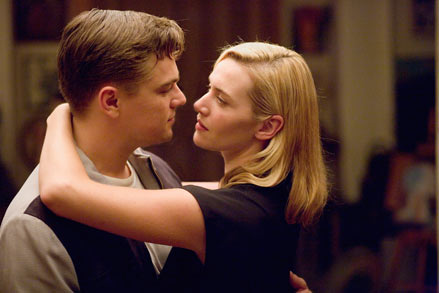
If you haven’t seen the trailer, the setup is thus: Slumming-it longshoreman Frank (di Caprio) and aspiring actress April (Winslet) meet at a party, fall in love, and get married. So far, so good. (The movie covers this very quickly, since it correctly presumes we all saw Titanic.) But when, following the rules of the game, Frank takes a sales job at his father’s place of work, the Wheelers buy a house in the Connecticut suburbs from the unsinkable Molly Brown (Kathy Bates), and the two have a few (exceedingly well-behaved, given how much grief they cause) kids, the unmistakable whiff of decay starts to set in.
Weren’t these two meant to travel the world and stay forever enthralled with each other? I mean, the suburbs are great and all for “average” people (say, Shep and Millie, the couple next door), but the Wheelers? And now the only throes of passion these two indulge in are screaming matches about relatively innocuous subjects, like April’s stab at community theater. (Suffice to say, Frank, who starts sleeping with at least one of his secretaries out of boredom, doesn’t much feel like King of the World anymore.) So when April comes up with a plan for the family to move to Paris and start over, they both lunge for it like a liferaft, one last-ditch chance to escape their desperate circumstances. But is venturing across the pond — this time, with no iceberg along the way, presumably — really a feasible plan, and will it change anything anyway? After all, wherever you go, there you are…and that same old spouse is sitting right next to you.
Part of the problem with Revolutionary Road is that, although Richard Yates’ 1961 novel was ahead of its time (no less than Kurt Vonnegut called it his generation’s Gatsby), by now we’ve seen all this before. We saw director Sam Mendes lambast the oh-so-stifling confines of suburbia in 2000’s overripe American Beauty. We saw Kate Winslet wither on the suburban vine in Todd Field’s Little Children. And we can watch beautiful, self-medicating people grapple with suburban ennui, marital boredom, outdated gender roles, and the postwar workplace every week on Mad Men. So, at this point, Road no longer feels all that revolutionary.
The other main problem is Mendes. While word is the man is an excellent stage director, I can’t say I’ve much cared for any of his movies (American Beauty, Road to Perdition, Jarhead.) And, here, Mendes’ stagy reserve helps undo the film. For whatever reason, Revolutionary Road often feels as cold, sterile, and clinical towards its characters as a boy pinning down butterflies. (This is particularly surprising given that Winslet is Mendes’ real-life wife.) When Leo frets and sulks in his fifties suits, and the tendrils of smoke from his cigarette dance to some mournful period tune or another, it’s impossible not to think of Wong Kar Wai’s In the Mood for Love or 2046, heartfelt movies that almost burst at the seams with melancholy and ache. But here, everything feels distant and removed, like a reverie on, well, an iceberg. And, when you don’t feel particularly involved with the characters, it’s hard not to notice how slack the film goes in its final third, as we all wait patiently for one of the Wheelers to follow through on the decision they clearly made half an hour before. (And when it finally happens, as Stephanie Zacharek and others have noted, the moment is over-stylized to the point of becoming ludicrous anyway.)
Still, there are small things to admire about Revolutionary Road despite its many flaws. The last two scenes in the movie (one between Shep and Millie, the other involving Kathy Bates and her husband) help to drive home a point which makes the movie considerably more interesting. Namely, that it’s not really the drabness of the suburbs driving the Whee(d)lers bonkers, but their own innate character flaws and inability to comprehend how adult, lifelong relationships often work. Winslet’s self-absorbed April can’t ever get over the fact that she didn’t turn out to be a unique and beautiful snowflake — welcome to the real world, Mrs. Wheeler — and di Caprio’s anxiety-ridden, constantly needy Frank just can’t stop poking at the sleeping dogs in his midst. (Like R.E.M.’s The Apologist, he’s at his most monstrous when he’s just trying “to work things out.”)
And then there’s Michael Shannon’s character, who shows up in the middle going as a dinner-guest who’s been through some electroshock therapy, and the guy so crazy he must be sane. The part is a cliche through and through, and (like most truth-tellers, I guess) Shannon overstays his welcome. (I preferred his random “howdy, chico” turn in Before the Devil Knows You’re Dead.) But, at least for a few moments, he breaks through the pall of stultifying stateliness otherwise cast over this dark corner of the suburbs.
